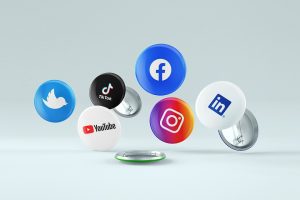Daniel Kushner, CEO and Co-Founder of Oktopost.
Image Source: Getty
B2B marketers are constantly navigating a whirlwind of change, striving to **engage their audience** and **capture attention** in ever-evolving landscapes. To succeed, they must embrace **risk**, challenge outdated practices, and welcome innovative ideas. Clinging to the past can alienate potential customers and talented employees who crave more from brands.
As we prepare to step into 2025, marketing leaders in the B2B sector must reconsider their strategies to align with the expectations of modern audiences—individuals who demand **authentic**, **personalized**, and **engaging content**. As Steve Lucas, CEO of Boomi, aptly stated in the foreword to my book The Social B2B Organization: “The same individuals who engage with brands on social media in their personal lives are the decision-makers in boardrooms.”
Today’s young professionals, especially **Gen-Z**—who represent nearly a third of all U.S.-based B2B platform users—are spearheading this shift. They seek brands that resonate with their values and show a genuine commitment to addressing real-world issues. Consequently, B2B marketers must adapt to not only remain relevant but also to thrive in an increasingly competitive environment.
To succeed in 2025, B2B marketing will require **agility**, **technological innovation**, and **authentic engagement strategies**.
The Power Of Authentic Engagement
Today’s audiences crave **authenticity**. They are weary of corporate jargon and glossy ads; instead, they yearn for **human-centered content** that genuinely reflects a brand’s values. Companies that can deliver **transparent messaging** are more likely to forge **long-term trust** and **loyalty** with their customers.
However, amidst this demand for genuine content, a recent Gartner report revealed that **68% of people** feel brands fail to share relevant or interesting content on social media. So, how can brands break through the noise?
**Employee advocacy programs** emerge as one of the most effective ways to humanize a brand. By encouraging employees to share personal stories, insights, and milestones, companies can foster **authenticity**, nurture **trust**, and extend their reach in ways traditional marketing cannot. Posts shared by employees can reach up to 561% more individuals than those shared solely by brand pages. This represents a golden opportunity to amplify your brand messaging authentically.
Moreover, employee-driven **social selling** significantly enhances visibility and impacts revenue directly. Research indicates that 78% of salespeople engaging in social selling create 45% more sales opportunities compared to their counterparts who don’t.
To harness the power of employee advocacy, leaders must first **embrace its value** and actively partake. Subsequently, they need to equip their teams with tools that facilitate sharing experiences and building meaningful relationships that boost visibility.
Using AI To Personalize Marketing
Artificial intelligence is transforming the realm of B2B marketing. AI tools enable businesses to deliver **highly personalized content**, finely segment audiences, and enhance real-time campaign optimization.
AI-driven analytics can predict customer behavior and recommend the most relevant content for each buyer persona. This translates into more targeted **whitepapers**, **webinars**, and other resources tailored to those who will find them valuable.
In today’s landscape, **personalization** is no longer a luxury—it's a necessity. A survey revealed that **71% of customers** expect brands to personalize interactions, and **76% feel frustrated** when they don't. This underlines the critical need for **automated audience segmentation tools** to ensure that outreach messages land where they are intended.
AI also streamlines operations, saving time and enhancing efficiency. Tasks such as scheduling posts, generating reports, and analyzing data can now be automated, freeing teams to focus on **strategic planning** and **creative content**. AI serves not just as a tool, but as a **collaborator** in content creation, assisting marketers from idea generation to copywriting and message refinement.
These advancements make AI an integral component for B2B marketers. By weaving AI tools into their workflows, businesses can elevate the relevance and effectiveness of their marketing campaigns.
The Importance Of Strategic Agility
The ability to stay agile and respond dynamically to shifts in audience behavior, platform algorithms, industry trends, and evolving regulations can distinguish industry leaders from followers.
Utilizing online **social listening tools** to proactively monitor trends enables B2B marketers to track audience sentiment, identify hot topics, and engage in real-time discussions across platforms. Social listening has become an indispensable tool for businesses, empowering leaders to adopt a more **market-driven approach** to brand perception through publicly available data—often replacing traditional surveys to understand consumer attitudes, mitigate reputational risks, and uncover emerging trends and market opportunities.
Consider the recent explosion of **short-form video content** on platforms like Instagram. Initially centered on B2C interactions, these platforms are now being embraced by B2B marketers to engage wider audiences with content that aligns with the **fast-paced, visually driven** consumption styles of today’s consumers.
This proactive approach to embracing diverse content types and platforms allows marketers to connect with untapped audiences before these channels become overcrowded. Companies that implement **agile marketing strategies** and equip teams with tools for real-time insights see enhanced engagement and adaptability, evidenced by 96% of marketers claiming that agility is crucial in achieving primary marketing goals.
The Journey Of Taking B2B Marketing To Market
B2B marketing is evolving at breakneck speed. In 2025, success will hinge on a brand's capacity to deliver **authentic engagement**, leverage AI for **personalization**, and maintain **agility** in response to technological advancements and trend shifts.
For brands to stay ahead, leaders must invest in the appropriate tools and practices that foster genuine connections, target relevant audiences, and adapt quickly to market changes. By doing this, they will drive growth, cultivate trust, and position their organizations as **industry frontrunners**.
In an era characterized by rapid technological evolution, it is the **human voices** and **authentic messages** that will resonate most, and their impact has never been more critical.
**Looking to learn more about effective B2B marketing practices? Connect with top experts in the industry through the** Forbes Technology Council, an exclusive community for world-class CIOs, CTOs, and technology executives.






